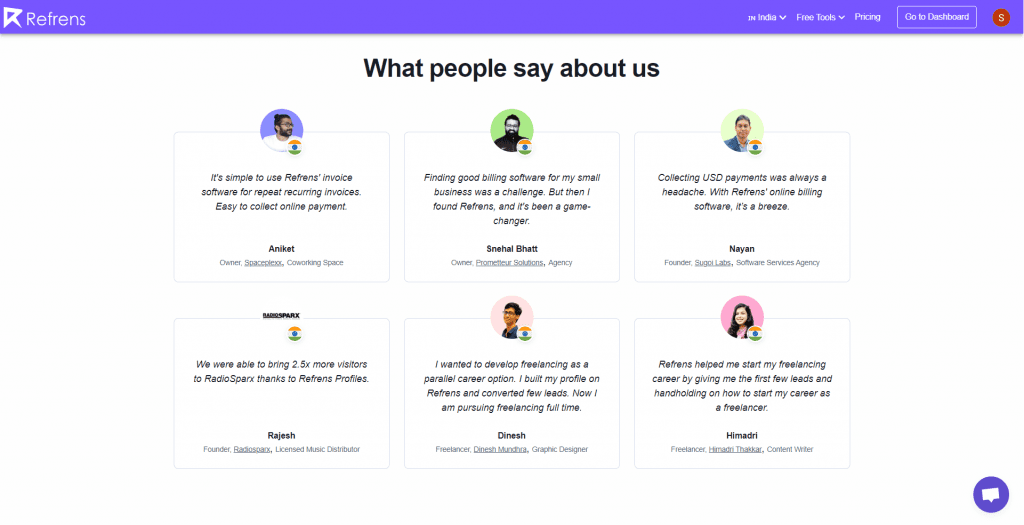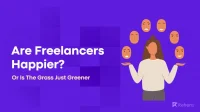Are you a night owl by nature? Maybe you like to work late at night and sleep late in the morning. Unfortunately, in traditional 9-to-5 work, it’s not achievable.
For many working professionals, freelancing has become a modern career choice, as they prefer working on their own terms.
India is the world’s second-fastest-growing freelancing market, with more than 15 million freelancers in the country.
What is freelancing?

In the 1800s, the term “freelance” described a medieval mercenary who would fight for the highest pay.
The name “lance” referred to a long weapon used by knights on horseback to knock their opponents off their rides.
Over time, the term came to imply “independent,” but it moved away from the battlefield to politics and, eventually, any type of work.
And today freelancing has become the modern way to work. In fact, it is not just a way to work but a lifestyle that is appealing to people!
It is a contract-based job in which a person uses his or her talents and experience to give services to a variety of clients rather than being hired by an organization.
Simply said, freelancing is when you use your abilities, knowledge, and experience to work with a variety of clients and take on a variety of jobs without being tied to a single company.
Moreover, the future of freelancing is bright!!! With over 560 million internet users, India has the world’s second-largest online population and by 2023 it will be over 650 million internet users. As a result, freelancing will continue to gain traction as a viable career option.
Who is a freelancer?
Freelancing is a contract-based job in which a person uses his or her talents or skills to give services to a variety of clients rather than being hired by an organization.
It’s a type of self-employment that’s comparable to running a home business. As an alternative to a home business, a freelancer can work as a contractor.

Difference between a freelancer & and a full-time employee
But before you set on a freelance path, let’s compare freelancing and full-time employment to see what sits well with you.
| Aspect | Freelancer | Full-Time Employee |
| Employment Relationship | Freelancers work as independent contractors, not company employees. | Full-time employees have formal, ongoing employment with the company. |
| Work Schedule | Freelancers enjoy flexible schedules and manage their own time. | Full-time employees follow set hours determined by the employer. |
| Benefits & Job Security | Freelancers often have fewer benefits and less job security. | Full-time employees typically receive benefits and have more job security. |
| Tax Responsibility | Freelancers handle their own taxes, including income tax and self-employment tax. | Full-time employees have taxes withheld by the employer. |
| Supervision & Control | Freelancers have more control over their work methods. | Full-time employees work under the employer’s supervision and follow company policies. |
| Long-Term Career Growth | Freelancers gain diverse experiences but may miss out on long-term career development within a single company. | Full-time employees have opportunities for promotions and skill development within the company. |
Why should one freelance?

- Be your own boss
The freedom to be your own boss is the most prevalent reason for starting out as a freelancer or entrepreneur.
Say bye-bye to dealing with control freaks in management or clocking in and out of the office. Also, no more scoldings for being late.
- Your time, your way
Unless you want it to be, there is no 9 to 5. You can work between the hours of 2 a.m. and 6 a.m. if that is when you feel most productive.
If your clients expect you to be available from 9 a.m. to 5 p.m., you can always justify absences as “client meetings”. Who’s going to notice?
- You can work from anywhere
Freelancing provides you with work-from-home opportunities and enables you to relocate regularly or semi-regularly.
- You can choose the clients and the projects you wish to do
Freelancers and entrepreneurs select projects depending on their skills and interests.
They are not obligated to deal with creeps and have complete control over who they wish to collaborate with.
Read more about what are the skills that every freelancer needs.
- 100% job security
When you’re the boss, nobody can fire you.
There are ups and downs to freelancing, but in the end, you have complete control over your career and earnings if you stick with it.
Characteristics of successful freelancers

- Hard Work
Having your own company is usually a lot of work. Solo freelancers and new design agency owners can only sell their own expertise. As a result, one of the most significant characteristics of a freelancer is the ability to work hard.
- Communication skills
Freelancers and entrepreneurs are constantly communicating with their clients, peers, and the rest of the world. As a result, fluency in the language.
Even if you’re not a freelance writer, you’ll need to be able to present yourself well in writing, over the phone, or in person.
You’ll also need to understand a variety of communication tools. Skype, Trello, Basecamp, IM, VoIP phone system, Voice Mail, Slack, etc. Though don’t get overwhelmed, they are majorly easy and can be learned in the process.
Read more: Communication Tips with Potential Clients As a Freelancer
- Professionalism
You must maintain professional conduct. You should dress appropriately if you have a client meeting. If you make a commitment, you must follow through. Ensure to always act ethically and lawfully.
- Persistent
In order to gain clients, you must be persistent in your marketing and sales efforts.
Aim to provide value to your clients, and be committed to providing the finest work possible.
- Passion and skills
Passion, abilities, and achievement go hand in hand. You’ll succeed if you don’t stop yourself from improving your skills.
- Flexibility
As a freelancer, you can’t do anything you want to. You’ll get up at 6 a.m. and work until 2 a.m. on certain days because you have a promise to keep.
At times, you might also have to do boring, repetitive tasks as part of a larger, more interesting project.
Hence, to thrive, business owners must be adaptable in their approach.
- Goal-oriented
Setting and accomplishing objectives, as well as being able to review and amend plans while developing new goals, can provide a sense of achievement and self-worth in freelancing.

Can one pursue freelancing as a career?
Yes, freelancing today is more than just a side hobby. It is a lifestyle that people choose. Full-time freelancers are their own bosses, control their own schedules, and set their own goals.
Today, people value freedom, and flexibility more than a corporate job that pays you a higher salary. While initially freelancing as a career seems to come with instability, however, once you have established a pipeline there is no looking back. With better workflow, repetitive clients, and good financial management, it is totally possible to live a life king-size as a freelancer.
Thus, becoming a full-time freelancer is a simple and cost-effective method to start working from home. Today, MNCs hire freelancers for projects, and many corporations are also changing and becoming more open to accepting freelancers in their work culture.
Since freelancing is fun and adds higher value when Compared to a full-time job, the growth graph in freelancing is exponential.
Also, “Being your boss is frequently a more exciting and fulfilling experience than working as part of a larger group”. Hence, once you start freelancing, that is working your own way, there is no looking back.
Pros and cons of freelancing

No decision is ever complete without a pro and con list!
Pros of freelancing:
1. Flexible Freedom: Freelancers enjoy the freedom to set their own schedules and work from anywhere.
2. Diverse Opportunities: They can work on various projects across different industries, keeping work interesting.
3. Skill Development: Freelancing offers hands-on experience, fostering rapid skill growth.
4. Income Potential: With the right clients, freelancers can earn a potentially higher income.
5. Tax Advantages: Freelancers benefit from tax deductions for home offices and business expenses.
6. Personal Growth: Freelancers develop valuable skills in self-discipline, time management, and resourcefulness.
Cons of freelancing:
1. Income Variability: Freelancers often experience income fluctuations, which can be financially uncertain.
2. Lack of Benefits: Freelancers miss out on employer-provided benefits like health insurance and retirement plans.
3. Isolation: The solitary nature of freelance work can lead to feelings of loneliness and reduced social interaction.
4. Tax Responsibilities: Freelancers are responsible for both employer and employee taxes, increasing financial obligations.
5. Client Challenges: Dealing with difficult clients is an inherent part of freelancing and can be challenging.
6. No Paid Leave: Freelancers do not receive paid vacations or sick days, leading to potential income loss when taking time off.

Important skills needed to become a freelancer
Having the right skills is also very important to be your own boss. Some of many are –
1. Self-Discipline: Freelancers must manage their own time effectively, set deadlines, and stay motivated without external supervision.
2. Communication: Clear and timely communication with clients is essential for understanding project requirements, setting expectations, and resolving issues.
3. Time Management: Efficiently allocating time to various tasks, including project work, client communication, and administrative tasks, is crucial.
4. Adaptability: Freelancers often work on diverse projects, so the ability to quickly adapt to new industries and technologies is valuable.
5. Technical Proficiency: Depending on the field, freelancers need strong technical skills related to their area of expertise, whether it’s programming, graphic design, writing, or another discipline.
6. Marketing and Self-Promotion: Effective self-marketing is essential for finding clients and building a freelance business. This includes creating a portfolio, networking, and using social media.
7. Financial Management: Freelancers need to handle their finances, including budgeting, invoicing, and managing taxes.
8. Problem Solving: The ability to identify and solve issues independently is crucial in freelancing, as you’ll often encounter challenges while working on projects.
These skills will not only help you as freelancers excel in your work but also build a successful and sustainable freelance career.
Continue reading at Top Skills That Every Freelancer Needs.

Niche in freelancing
When it comes to modern business, there’s a reason why the adage “The Riches are in the Niches” has almost become cliche.
That’s because figuring out how to find your freelance niche allows you to tap into something unique.
At first glance, it is counter-intuitive: a smaller audience should imply fewer alternatives, right? In many circumstances, though, the exact opposite is true.
You end up promoting yourself as an expert once you find your freelance niche and then you will be able to charge more.
Always keep in mind that any project can be successful if it combines the skills and the budget of the client.
It’s a good idea to start with what you already know. Examine the industries in which you’ve worked or are presently employed. Starting with the knowledge you already have that will yield the fastest results for your freelancing profession.
You can, however, learn as you go. You may improve your expertise by reading content in your niche and keeping up with industry news. You’ll need to master industry jargon as well as your target audience’s “language”.
Now that you are ready to kickstart your freelancing journey, below are some freelance platforms that might assist you in creating your profile and connecting with possible clients.

How to find a freelancing niche
Now let’s see how you can decide on your much-needed niche!
Know Yourself: Figure out what you’re good at and what you enjoy doing. Your niche should match your strengths and interests.
Check What People Need: Look around to see what kind of freelance jobs are in demand. Find areas where lots of people are looking for help.
Be Special: Think about what makes you different from other freelancers. It could be a skill, experience, or a unique way of doing things that makes you stand out.
Try it Out: Before committing fully, try taking on a few small jobs in your chosen area. See if you like it and if there are enough opportunities.
Talk to Potential Clients: Have conversations with people or businesses who might hire you in your chosen niche. Understand what they need and make sure your services can help them.
By following these steps, you can discover a freelancing niche that suits you and has enough demand in the market.

How can you tell if you are prepared for freelancing :
Sit with a book and a pen, and analyze yourself. If you meet the following signs, then you are all set for the freelance dance!
1. Strong Self-Discipline: You can manage your time effectively, set and meet deadlines, and stay productive without someone supervising your work.
2. Sufficient Skills and Expertise: You possess the necessary skills and expertise in your chosen field or niche. Clients will hire you based on your expertise and the value you can provide.
3. Financial Stability: You have some financial stability or savings to cover your expenses during potentially lean periods when freelancing income may be irregular.
4. Self-motivation: You are highly self-motivated and can maintain your enthusiasm for work even when facing challenges or setbacks.
5. Networking and Client Base: You have a network of potential clients, contacts, or a plan for finding clients. Building and maintaining a client base is crucial for freelancers.
6. Business Knowledge: You have a basic understanding of business operations, including invoicing, taxes, contracts, and client communication.
If you see these signs in yourself, you’re likely well-prepared for freelancing and ready to embark on your freelance career.

Freelancing Platforms
Companies can use freelance platforms and marketplaces to hire temporary individuals for projects or positions that don’t require full-time employees.
To do so, you’ll need to create a profile on these sites, upload your resume, and then connect with potential employers.
Employers and job seekers both advertise their openings on freelance networks. You can apply for any project that you are interested in, and use websites like Refrens which can help you get your freelancing career off to a good start. They assist you in quickly gaining your first client and earning the trust of employers.

Here’s a list of the best marketplaces for freelancing
You may reach worldwide freelance talent with the help of some excellent freelancing marketplaces and platforms. It benefits freelancers, corporations, and even the marketplace’s founders. They are ideal for freelancers since they allow them to access a wide range of tasks and new prospects.
Here’s a list of the best platforms for freelancers:
- Refrens
- Upwork
- Fiverr
- Freelancer
- Guru
- People per hour
- Toptal
- Flexjobs
If you want to work as a freelancer, you can use any of the platforms listed above, as they are trustworthy and reliable. You only need to determine which option best suits your skillset and then choose the best one for you.
Why choose refrens as a freelancer?

Global Trust: Refrens is your passport to a global network of 150,000+ professionals spanning 178 countries. This global trust opens doors to diverse clients and collaborations, helping you showcase your skills, take on thrilling projects, and skyrocket your freelance career worldwide!
Free Registration: Refrens believes freelancing should be accessible to all. Hence, registering and getting started with Refrens is absolutely free!
Simplified Profiling: Your Refrens profile is designed for simplicity and clarity. It allows you to present your skills, portfolio, and services in an easy-to-understand format. You can also showcase client testimonials. Refrens also provides a custom domain and improved visibility on Google, which will enhance your online presence, making it effortless for potential clients to discover your offerings.
All-in-One Platform: Refrens is your freelancing superhero, offering an integrated platform that’s your one-stop shop for success. From crafting pro quotes and invoices to smooth payment handling and enlightening insights, it’s all right here. And guess what? Their Sales CRM System is like your sidekick, automating lead capture, simplifying sales pipelines, and centralizing lead chatter through WhatsApp and email, making it a perfect all-in-one platform.
Some of the testimonials of the freelancers

Conclusion
You can begin giving your services right away, especially if you have a skill. Working from home as a freelancer is an easy and cost-effective way to get started.
What are you waiting for? Be a night owl if you want to or be an early bird. There are no time bounds to freelancing. This is the freedom that comes when you choose to freelance as your modern career choice. Start your freelancing journey with Refrens and be ready to be your own boss.
Are you ready to get your first client? Read our article on the basics of sales for freelancers to optimize your sales strategy.

















